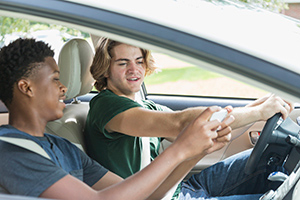ADHD & Driving? Research Points to Meds

When we first learn to drive, we pay attention to every little detail-staying in the lane, how much pressure we need on the gas or the brake pedal, the drivers around us, using our turn signals. Once we have enough practice, we tend to not think deliberately of each of these actions. The unconscious part of our brain takes over those details, freeing our minds to think about other things. But is that a good thing?
Drivers affected by ADHD have challenges with executive function. They are at greater risk of having car accidents and receiving traffic tickets for speeding or traffic violations. For teen drivers with ADHD, the risks are even greater.
Research shows that car crashes for drivers with ADHD are dramatically reduced when drivers employ medication as part of their treatment plan. But driver safety isn’t as simple as just taking your medication. What else do you need to know before you get behind the wheel?
Distracted driving
Music, phone calls, texting, eating on the go, adjusting the temperature, videos to entertain your children – all these things can contribute to distracted driving. They take your focus off the road for brief moments or extended periods of time. Distracted driving accounts for more than half of car crashes.
It is easy to think that it’s “okay” to do something other than focus on driving. Yet, according to the National Highway Traffic Safety Administration, taking your eyes off the road for five seconds at 55 mph is like driving the length of a football field with your eyes closed.
ADHD increases risks for drivers
ADHD impairs executive function, which is critical for driving. Driving requires you to process a huge amount of visual information, anticipate the actions of other drivers, and coordinate multiple actions with your hands and feet. Multitasking automatically lowers your ability to place your full attention to a task and can even make it harder to perform the skills needed for driving.
Daniel Cox, PhD, is one of the leading researchers on the effect ADHD has on a person’s driving abilities and has been a guest expert on driving for one of our Ask the Expert webinars.
“Automobile accidents are a leading cause of death for people between ages 6 and 25,” Dr. Cox tells UVAToday for the University of Virginia. “For adults who don’t have ADHD, after age 25, the accident rate starts to decline significantly. That’s not true for those with ADHD. They are elevated during adolescence-three to four times more collisions, injuries, etc.-but the rates don’t go down, as they do for the general public, as they get older. The good news is that medications improve not only driving safety, they reduce collisions. [W]hen ADHD people are on medication, their accident rates radically drop.”
Reduce risks with medication
Researchers looked at 2.3 million drivers affected by ADHD and found the rate of car crashes was dramatically lower for drivers taking medication to help manage their ADHD symptoms. The researchers found a 38 percent lower risk of accidents for men when they were taking medication, compared to when they were not taking their medications. For women, the risk was 42 percent lower. These reductions were found across all age groups in the study.
Taking medication is not enough to prevent a crash-understanding how your symptoms may affect your driving is essential. ADHD medications have limited amounts of time when they are active in a person’s system. Discuss your symptoms and when you are normally driving with your healthcare provider to determine the best medication for you and the best time to take it.
Good driving habits are possible
Driving presents multiple challenges for people affected by ADHD, but research shows medication management helps to significantly reduce the risks of a car crash across all age groups, regardless of the level of experience of the driver. Take the time to understand how your symptoms may affect your safety as a driver, and discuss medication options with your healthcare provider.
What have you found helps you to keep your eyes on the road while driving?
